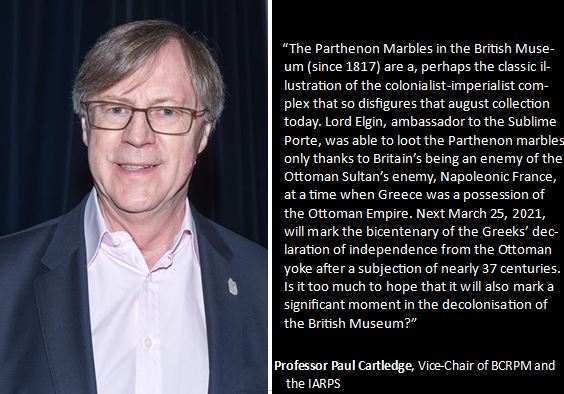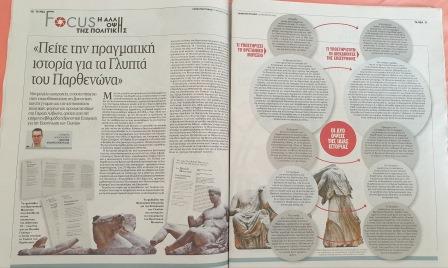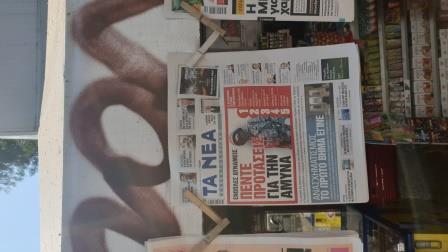Ta Nea, 01 August 2020
UK correspondent for Ta Nea, Yannis Andritsopoulos wrote on Saturday 01 August 2020:
A new chapter in the campaign for the return of the Parthenon Sculptures will start next week, aimed at raising awareness of the public opinion and mobilizing politicians, organizations and public figures in the UK.
The main slogan of the campaign, run by the British Committee for the Reunification of the Parthenon Marbles, is "Tell the real story", with the BCRPM inviting the British Museum to reveal to its visitors the truth about how the sculptures, displayed in London since 1817, were acquired.
“We urge the British Museum to tell the full story as Greece is preparing to celebrate 200 years of independence. The Parthenon Marbles were removed by Lord Elgin when Greece could not speak out. Reuniting the surviving sculptures from the Parthenon would be a friendly and just act by a nation looking to take the lead in responding to global challenges,” Dame Janet Suzman, Chair of the British Committee for the Reunification of the Parthenon Marbles, told Ta Nea newspaper.
The BCRPM is made up of respected British scholars, academics and artists, such as Emeritus Professor of Late Antique and Byzantine Studies Judith Herrin, fellow of the British Academy Professor Oliver Taplin and archaeologist Anthony Snodgrass.
“The Parthenon Marbles in the British Museum (since 1817) are a, perhaps the classic illustration of the colonialist-imperialist complex that so disfigures that august collection today. The large fortune acquired by the Museum’s founding collector and benefactor, Dr Hans Sloane, was itself deeply mired in the slave trade, and Lord Elgin, ambassador to the Sublime Porte, was able to loot the Parthenon marbles only thanks to Britain’s being an enemy of the Ottoman Sultan’s enemy, Napoleonic France, at a time when Greece was a possession of the Ottoman Empire. Next March 25, 2021, will mark the bicentenary of the Greeks’ declaration of independence from the Ottoman yoke after a subjection of nearly 37 decades. Is it too much to hope that it will also mark a significant moment in the decolonisation of the British Museum” said Professor Paul Cartledge, A.G. Leventis Professor of Greek Culture emeritus, University of Cambridge, Vice-Chair of the BCRPM.

The BCRPM has produced a leaflet aimed at deconstructing the British Museum's arguments which are included in a leaflet distributed to visitors of Room 18 - also known as the Duveen Gallery - which houses the Sculptures. It says that this leaflet contains "inaccuracies and untruths" (the Museum goes so far as to claim that the Greek authorities completed Elgin's work because they transferred the Sculptures to the Acropolis Museum!).
Therefore, the BCRPM produced its own leaflet which contains the "true story" of the Parthenon Sculptures. It will soon send it to the British government, political parties and MPs, trustees of the British Museum and the British media. In addition, on specific dates in the fall, activists will distribute the booklet to British Museum visitors.
The campaign, which will unfold in the coming months, accompanied by the hashtags #TellTheStory, #TimeIsNow and #BMJustDoIt, is dedicated to the inspirers of the campaign in Britain, Eleni and James Cubitt, who had been urged to launch it by Melina Mercouri.
"Lusieri, the artist hired by Lord Elgin, literally demolished the temple so that he could extract the Sculptures," Robert Browning, a professor of Classics at the University of London and first Chair of the BCRPM, said on April 16, 1983, interviewed by Hara Kiosse for Ta Nea.
"That is why, when I hear that Elgin took the marbles so that they do not end up becoming quicklime in the hands of the Greeks, or that the British Museum keeps them because they are in danger due to air pollution of Athens, I feel that what they say is sacrilege."
Thirty-seven years on, the Museum still houses Pheidias's masterpieces, with its spokesperson telling Ta Nea that "the possibility of their permanent return is not being considered" and Marlen Godwin, the BCRPM's International Relations Officer, responding: "We will not give up. We will continue to call for the reunification of the Sculptures. Until then, we call on the Museum to reveal the truth to those who visit it to see the Marbles. That's the least it can do. "
Main points of the leaflet here.


Ta Nea, 01 August 2020